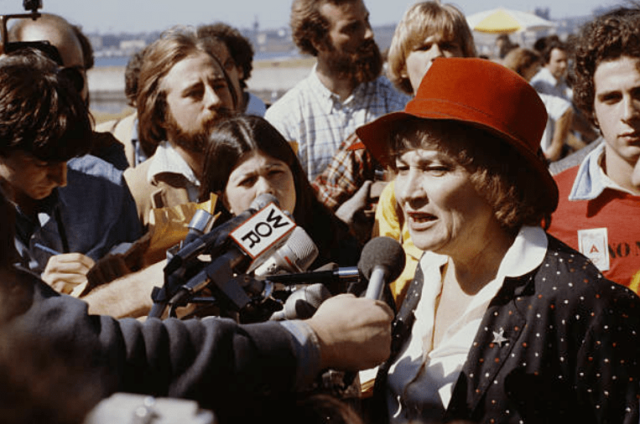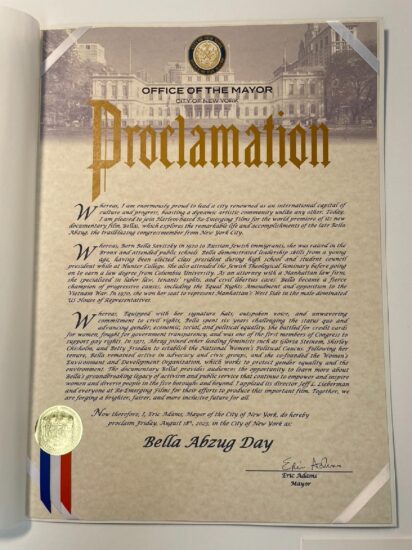
Bella Abzug defiantly makes her case in Jeff L. Lieberman’s new documentary opening at the Quad
BELLA (Jeff L. Lieberman, 2023)
Village East by Angelika
181-189 Second Ave. at Twelfth St.
August 18-24
www.angelikafilmcenter.com
When I was a kid, we often wondered, “WWBD?” — “What would Bella do?,” referencing Bella Abzug, a towering New York City political figure beginning in the 1970s. Today too many people might answer that question with “Bella who?”
Jeff L. Lieberman’s new documentary, Bella! This Woman’s Place Is in the House, lays out precisely who she is and what she did during her roller-coaster career as an ahead-of-her-time advocate for change whose campaign slogan was, in pure Bella fashion: “This Woman’s Place Is in the House.”
“She came out and screamed about what was going on with women. It really upset the white male power structure, who was being frightened by women coming in and taking over their power. That didn’t stop Bella,” one of her campaign aides, Arnie Weiss, says. “She talked about the issues that mattered to me: women’s rights, gay rights, civil rights, nuclear disarmament, protecting the environment, ending the war in Vietnam,” actress, singer, and activist Barbra Streisand explains. And former House Speaker Nancy Pelosi points out: “She knew that she wasn’t there just for Bella and her generation, that she was there to make sure that the doors were open for what came next.”
Born Bella Savitzky in the Bronx in 1920, the year that women got the right to vote, Bella was a fighter from the start, challenging the traditions at her parents’ synagogue and enrolling as one of only six women out of 120 in her Columbia Law School class. She married Martin Abzug, had two daughters, and then, in 1950, began five decades of battling for minorities and the underprivileged, defending the wrongly accused Willie McGee in a rape case in Mississippi. She railed against Joe McCarthy, befriended Malcolm X’s family after he was assassinated, and joined the “Women Strike for Peace” movement, protesting against nuclear weapons.
After helping New York City mayor John Lindsay get reelected in 1969, she decided to run for office herself, challenging seven-term incumbent Leonard Farbstein in the primary and talk show host Barry Farber in the general election for Manhattan’s 19th Congressional District seat. She was unrelenting, feisty, and loud, adopting a trademark look by always wearing a hat, building up a wealth of supporters as well as plenty of detractors.
“She was called all kinds of names. She was loved and definitely hated,” her daughter Eve, a social worker, says. She had to take “all those barbs and even worse from men who should have known better . . . a real organized effort to create a monster who’s not liked,” Phil Donahue explains. “She went with the hat, and she took off the gloves,” actress and activist Shirley MacLaine emphasizes.
Through archival news footage, home movies, audio diaries, photographs, and new interviews, Lieberman celebrates Abzug’s fierce courage as she refused to allow anything or anyone to get in her way as she sought equality across the board. “To all of us young kids, Bella represented the mother that we all wished we had,” gay rights activist Allen Roskoff says, recalling a night when Abzug campaigned at the Continental Baths in front of a bevy of naked men.
Among those who discuss Abzug and her legacy are many people who were with her in the trenches, including journalist and activist Gloria Steinem, activist and politician Ronnie Eldridge, Congresswoman Elizabeth Holtzman, campaign aide and undersecretary of commerce Eric Hirschhorn, actress and activist Marlo Thomas, press secretary and historian Harold Holzer, activist and author Letty Cottin Pogrebin, political consultant Dick Morris, Congresswoman Maxine Waters, Treasury secretary Jack Lew, jewelry designer Lois Sasson, poet and activist Robin Morgan, author and actress Renée Taylor, administrative aide and later literary agent Esther Newberg, and Congressman Charles Rangel in addition to former first lady and senator Hilary Rodham Clinton, New York Times editor Max Frankel, former NYC mayor David Dinkins, Battling Bella author Leandra Zarnow, and Bridgette McGee, granddaughter of the executed Willie McGee.
Lieberman (The Amazing Nina Simone, Re-Emerging: The Jews of Nigeria) tracks Abzug as she argues for the Equal Credit Opportunity Act, runs for the Senate and mayor, shakes up the seminal 1977 Women’s Conference in Houston, and confronts CIA director George H. W. Bush about a file on her, all the while enjoying a loving relationship with Martin. Former traffic reporter Captain Dan Rosenson relates a remarkable story of attempting to helicopter Abzug into a 1971 antiwar protest that had turned violent.

Abzug, who died in 1998 at the age of seventy-seven, was not always successful — she lost several elections, and many of the policies she supported failed to make it into law — but she paved a trail for others to follow. She was so far ahead of her time that it would be fascinating to see how she would fare in today’s painfully divisive America.
“She was just too real,” Steinem says.
“She was just too early,” Tomlin adds.
“I never felt like I couldn’t have it all,” Abzug herself said.
The film passionately reestablishes Abzug’s well-earned credentials and importance to America’s modern sociopolitical history. In 2015, Bank St., where she lived, was renamed Bella Abzug Way; Bella Abzug Park opened in Hudson Yards in 2022; and Mayor Eric Adams has proclaimed August 18, 2023, as Bella Abzug Day, in honor of the world premiere of Bella! in the Village.
[Mark Rifkin is a Brooklyn-born, Manhattan-based writer and editor; you can follow him on Substack here.]